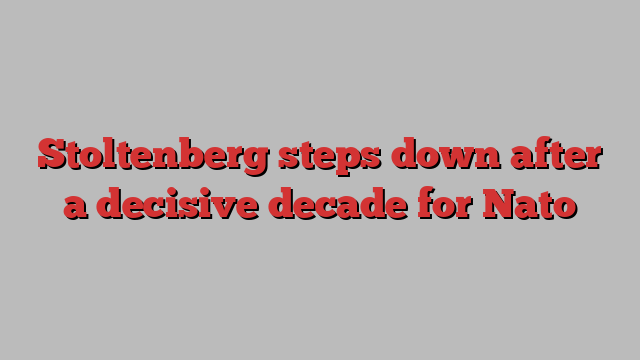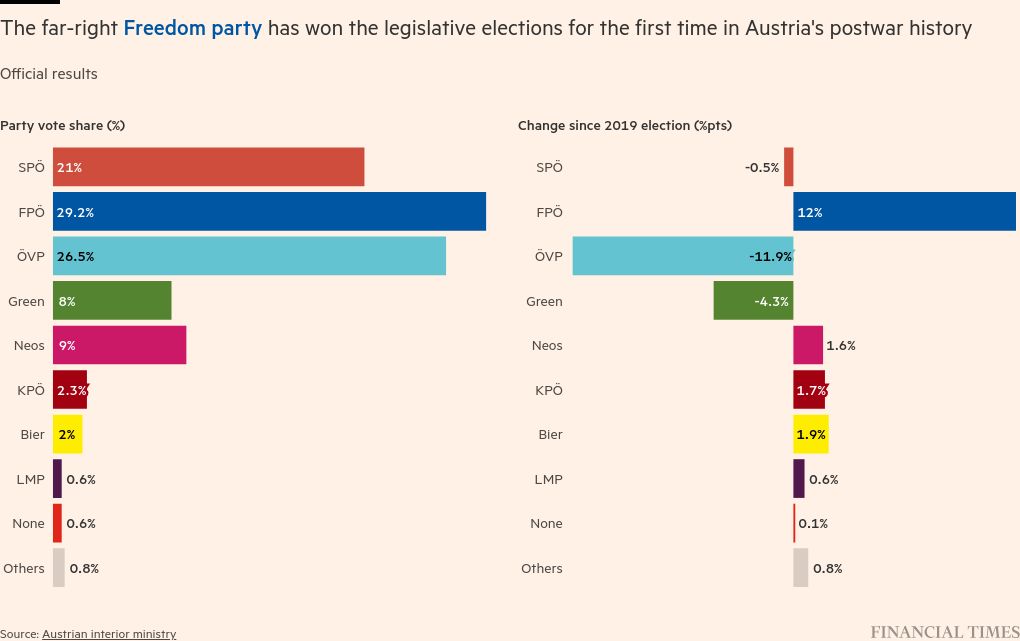
This article is an on-site version of our Europe Express newsletter. Premium subscribers can sign up here to get the newsletter delivered every weekday and Saturday morning. Standard subscribers can upgrade to Premium here, or explore all FT newsletters
Good morning. Israel overnight launched a ground operation in Lebanon. That came hours after an emergency meeting of EU foreign affairs ministers saw chief diplomat Josep Borrell demand an immediate ceasefire, to no avail.
Today, I look back on Jens Stoltenberg’s decade at Nato, and Germany’s business lobby tells us they’re stepping up the war against red tape.
Dangerous decade
Jens Stoltenberg will step down as head of Nato today after a decade running the US-led military alliance marked by the return of war to Europe.
Context: The 65-year-old will be succeeded by Mark Rutte, the former prime minister of the Netherlands, at a ceremony in Brussels.
Appointed months after Russia’s invasion of Crimea and the eastern Donbas region, he steps down more than two and a half years into Russian President Vladimir Putin’s full-blown war in Ukraine.
While urging allies to send military support to Kyiv, Stoltenberg has also steered Nato through a dramatic scaling up of its military preparedness, drastically increasing the number of active duty troops, warships and fighter jets on Russia’s border to levels not seen since the cold war.
Three Nato members spent at least 2 per cent of GDP on defence when Stoltenberg arrived. This year, 23 will.
He also oversaw the swelling of Nato’s ranks to 32 countries as Finland and Sweden abandoned their neutrality in the face of Putin’s revanchism, joining Montenegro and North Macedonia which also became members during Stoltenberg’s decade.
But he also oversaw one of the alliance’s most shameful moments: the chaotic retreat from Afghanistan in 2021. The calamitous rush to evacuate thousands of troops as the Taliban took back control of the country left millions of Afghans whom Nato had promised to protect at the mercy of the extremist militants.
Stoltenberg, who is fond of admitting that the job “is more secretary than general” has been hailed for deftly handling the alliance’s so-called three presidents problem: how to manage the egos of the French, Turkish and US leaders.
His containment of Donald Trump, particularly as the threat of US withdrawal loomed over the 2018 summit, earned him the moniker “Trump whisperer”.
Stoltenberg has been waiting for this day for more than two years. He was supposed to step down in 2022, having already been selected to take up the trained economist’s dream job: governor of Norway’s Central Bank.
But the war in Ukraine saw US President Joe Biden ask him for another year, and then yet another extension last summer even as his Norwegian aides had begun moving home.
“This past decade has undoubtedly been the most transformational one for the alliance since the cold war,” he said last week. “As the world has changed, so has Nato.”
Chart du jour: Picking up the pieces

A historic victory by Austria’s far right has shattered the country’s political consensus. Fraught negotiations to form a new government began yesterday, and will involve tough decisions.
Business first
The head of Germany’s influential business association BDI has joined calls on Brussels to dampen its appetite for regulation, criticising EU climate legislation as “micromanagement”, writes Alice Hancock.
Context: The advent of a new European Commission has opened the doors to lobbying from all sides, but one common theme stands out: a need to cut back on regulations that are hampering European competitiveness.
“Red tape is really, really a big issue and we see that there is a lot of room for improvement,” Tanja Gönner, managing director of BDI, told the FT.
An earlier plan to have a one-in-one-out policy on new legislation had not worked, Gönner said. “We need a very systematic approach.”
The job for cutting back on the EU’s regulatory burden has fallen to Valdis Dombrovskis, a loyal henchman of commission president Ursula von der Leyen in her first term, who is now in charge of implementation and simplification, alongside economy and productivity.
Gönner said that more dialogue was needed with industry, and better alignment of climate goals with industrial competitiveness. “We don’t think we should talk about the [climate] goals, but should talk about the way [to get there] and go out of micromanagement,” she said.
For German industry, the outlook is particularly dire at the moment.
BASF, the world’s largest chemical group, cut its dividend by a third last week. Shares in Volkswagen, Thyssenkrupp and Continental, all German industrial stalwarts, have dropped this year as the effects of the 2022 energy crisis, Covid-19, and Chinese competition deepen.
According to a report published by BDI this month, a promised bump from the move towards cleaner, greener technologies has not yet materialised. The climate transformation “has so far only triggered very limited investment impulses”, it said.
What to watch today
-
Mark Rutte becomes Nato secretary-general.
-
European Commission president Ursula von der Leyen meets Swiss President Viola Amherd in Geneva.
Now read these
-
EU-UK baby steps: Why tomorrow’s talks between Ursula von der Leyen and Sir Keir Starmer “will simply be the beginning of the conversation” on closer ties.
-
‘Forever war’: Once buoyed by hopes of liberating Ukraine, even soldiers at the front now voice a desire for negotiations with Russia to end the war.
-
All together now: The FT samples Copenhagen’s growing appetite for communal dining.
Recommended newsletters for you
Trade Secrets — A must-read on the changing face of international trade and globalisation. Sign up here
Swamp Notes — Expert insight on the intersection of money and power in US politics. Sign up here
Are you enjoying Europe Express? Sign up here to have it delivered straight to your inbox every workday at 7am CET and on Saturdays at noon CET. Do tell us what you think, we love to hear from you: [email protected]. Keep up with the latest European stories @FT Europe